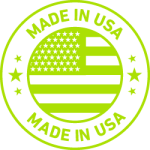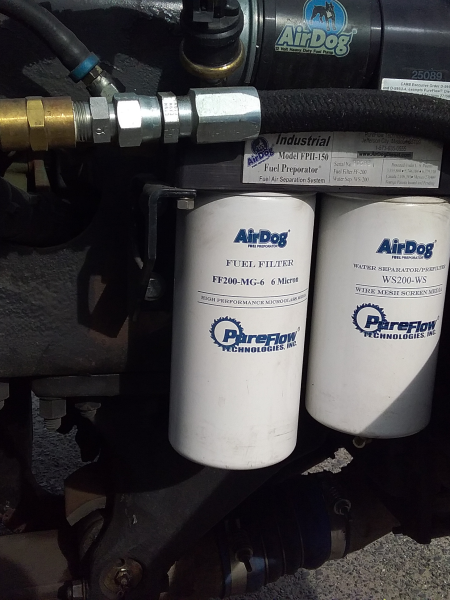

Diesel fuel is the lifeblood of heavy-duty trucks and critical engine components. Ensuring its purity and efficiency is essential for smooth engine operation and longevity. One often overlooked issue that can compromise diesel fuel quality is water contamination. Water in diesel fuel can result in rust particles entering the fuel, promote the growth of bacteria and microorganisms, and, more directly, cause premature wear and corrosion in fuel injectors and other engine parts.
Water contamination became a critical issue after we began using ultra-low sulfur diesel because it attracts more water and is less resistant to microbial growth than previous diesel fuels. Moreover, modern diesel fuel systems are less forgiving of water in the fuel, so it is more important than ever to minimize the opportunity for water to enter a truck’s fuel tank and to keep any water that does enter the tank from reaching the engine.
In this blog post, we’ll explore common ways water infiltrates diesel fuel and discuss methods for removing it.
It may surprise you, but water and diesel fuel are more connected than many realize. Diesel fuel has hygroscopic qualities, meaning it attracts and absorbs moisture from the air at the molecular level, so it almost always contains some water. The key is to minimize the water level by managing the more substantial sources of water contamination and filtering out the remaining water to maximize fuel efficiency and protect your engine. Let’s dive into how water can infiltrate your diesel fuel and what you can do to prevent it.
Most fuel retailers and distributors use water-detecting filters in their dispensing equipment to prevent water from entering your fuel system. However, these filters are effective only when adequately maintained. When these filters become saturated, they may allow water to be dispensed with the fuel. To safeguard against this problem, always buy your diesel fuel from reputable sources with well-maintained systems to minimize the risk of water contamination.
Water can find its way into diesel fuel through other means, including leaky storage tanks or human error. Poor or degraded tank seals can allow water into storage tanks, and human errors such as leaving a fuel tank cap off also invite water contamination. Human error plays a significant role in water entering a fuel tank, so emphasizing the importance of proper fueling procedures and maintenance should be a critical issue for fleets and independent truckers alike.
Another often-overlooked source of water contamination is condensation. Condensation can occur in storage tanks, especially in above-ground tanks, and in truck fuel tanks. Some condensation results from everyday temperature fluctuations, but the more significant challenge is operating the truck and drawing down the fuel in the tank. Unlike gasoline, diesel fuel does not create vapor pressure in the tank to displace air, resulting in air entering the tank as the fuel draws down during operation. Often, the air is drawn into the tank while operating in warmer and more humid conditions. Later, when the temperature inside the fuel tank becomes colder than the ambient air, condensation forms inside the tank. This condensation becomes free water that can enter your engine’s injection system if not removed beforehand. Of course, one means of reducing condensation is to top off the tank before parking it.
Removing as much of the water content as possible is crucial to ensure the purity of your diesel fuel and prevent free water from infiltrating your engine’s injection system. The best method to accomplish this goal is to use a high-quality filtration system that effectively separates air and water from the fuel entering your engine. You can achieve both using the AirDog® FPII system, which passes the fuel through a water separator before sending it to a particulate filter. Importantly, AirDog® recently introduced a new generation water separator, the PureFlow™ Technologies WS200-HS Water Separator/Pre-Filter, to maximize the system’s overall performance.
Our previous-generation water separator used a 144-micron wire mesh screen to remove water from the fuel before sending it to the AirDog® Champ™ High-Pressure Fuel Air Separator, which filters particulates to 6 microns. Our new PureFlow™ Technologies WS200-HS Water Separator/Pre-Filter uses Hydrosorb media to achieve an impressive water removal efficiency of over 99%. It also filters particulates to 30 microns before passing the fuel onto the second stage, the 6-micron particulate filter.
The new water separator displays excellent performance, but like many systems, proper maintenance must occur to achieve that performance. As in the past, the particulate filter has a 35- to 40,000-mile change interval. However, rather than reusing the water separator as in the past, the new water separator is replaced at the same time as the particulate filter. Doing so allows the system to achieve unparalleled water separation levels that reduce engine wear and tear.
Water in fuel tank issues can occur in any diesel engine, from everyday pickups to military vehicles. Water inside a gas tank or water in the gas can result from condensation, poor fuel storage, or contaminated supply lines. In a diesel in tank scenario, moisture mixes with fuel, causing corrosion, reduced efficiency, and even injector damage. The problem traces back to Rudolf Diesel’s original design, which never accounted for today’s low sulfur diesel (ULSD) formulations that can absorb more water. In the United States, even a small amount of water in the tank can cause symptoms of water in your engine such as rough idling, smoke, or stalling. Whether your vehicle runs on diesel fuel diesel or fuel oil, solutions include proper storage, regular draining, and fuel additives designed to disperse or remove moisture. Detecting and addressing excess water in the tank early helps prevent costly repairs.
There are many points at which water can enter diesel fuel, so it is essential to take the preventive measures needed to avoid fuel contamination, including practicing proper fueling procedures. Doing so will help maintain the efficiency and longevity of your heavy-duty truck’s engine. Still, water can enter your fuel despite following the strictest guidelines, so a critical step is investing in a top-tier filtration system to keep your engine running smoothly and protect it from the adverse effects of water-contaminated fuel.
Finding water in fuel tank situations is more common than most diesel owners realize, and it can happen in everything from daily drivers to military vehicles. Water inside gas tank or water in the gas problems can start from condensation, poor fuel storage, or contaminated fuel at the pump. When diesel in tank contains moisture, corrosion, injector damage, and fuel system failure can follow quickly.
Even the original Rudolf Diesel design didn’t account for today’s sulfur diesel ULSD fuels, which absorb water more easily. In the United States, ULSD is standard, meaning the risk of water in the tank is something every owner should understand. Whether you’re running on diesel fuel diesel or fuel oil, the symptoms of water contamination may include rough starts, smoke, reduced power, or stalling.
To address water contamination, start with prevention: regular fuel system inspections, keeping your gas tank sealed and topped off to reduce condensation, and using high-quality fuel additives that disperse moisture. If contamination occurs, immediate removal and filter replacement can protect your engine and keep your diesel running at peak performance.